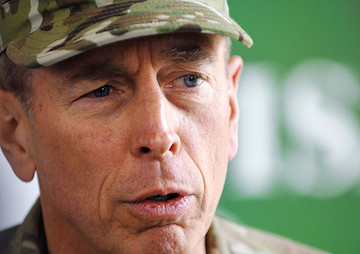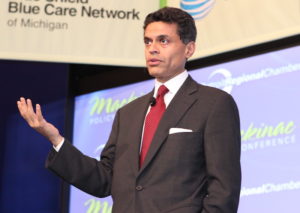Leaker, Speaker, Soldier, Spy: The Charmed Life of David Petraeus
It seems a robust Rolodex with the right global roster, a marquee name and a cultivated geopolitical brand covers a multitude of sins. And that’s precisely the type of firepower that Petraeus brings to the table. David Petraeus. (ResoluteSupportMedia / CC-BY-2.0)
1
2
3
4
David Petraeus. (ResoluteSupportMedia / CC-BY-2.0)
1
2
3
4
The experience of former NSA senior executive Thomas Drake who shared unclassified information about that agency’s wasteful ways with a reporter is more typical of what leakers should expect. Although the Justice Department eventually dropped the most serious charges against him — he pled guilty to a single misdemeanor — he lost his job and his pension, went bankrupt, and has spent years working at an Apple store after being prosecuted under the World War I-era Espionage Act. “My social contacts are gone, and I’m persona non grata,” he told Defense One last year. “I can’t find any work in government contracting or in the quasi-government space, those who defend whistleblowers won’t touch me.”
Petraeus, on the other hand, shared with his lover and biographer eight highly classified “black books” that the government says included “the identities of covert officers, war strategy, intelligence capabilities and mechanisms, diplomatic discussions, quotes and deliberative discussions from high-level National Security Council meetings, and defendant David Howell Petraeus’s discussions with the President of the United States of America.” Petraeus was prosecuted, pled guilty, and was sentenced to two years of probation and fined $100,000.
Yet it’s Petraeus who today moves in rarified circles and through hallowed halls, with memberships and posts at one influential institution after another. In addition to the positions he mentioned at New America, his CV includes: honorary visiting professor at Exeter University, co-chairman of the Task Force on North America at the Council on Foreign Relations, co-chairman of the Global Advisory Committee at the Woodrow Wilson International Center for Scholars, member of the Concordia Summit’s Concordia Leadership Council, member of the board of trustees at the McCain Institute for International Leadership, member of the National Security Advisory Council of the U.S. Global Leadership Coalition, and a seat on the board of directors at the Atlantic Council.
Brand Petraeus
About a year ago, I tried to contact Petraeus through KKR as well as the Macaulay Honors College at the City University of New York, to get a comment on a story. I never received a reply.
I figured he was ducking me — or anyone asking potentially difficult questions — or that his gatekeepers didn’t think I was important enough to respond to. But perhaps he was simply too busy. To be honest, I didn’t realize just how crowded his schedule was. (Of course, FT’s Edward Luce reports that when he sent Petraeus an email invite, the retired general accepted within minutes, so maybe it’s because I wasn’t then holding out the prospect of a meal at the Four Seasons.)
I attended the New America event because I had yet more questions for Petraeus. But I wasn’t as fortunate as Fred Kaplan — author, by the way, of The Insurgents: David Petraeus and the Plot to Change the American Way of War — and wasn’t quite speedy or nimble enough to catch the former general before he slipped into the backseat of that luxurious Mercedes sedan.
Irving Berlin’s “What Can You Do With A General?” ends on a somber note that sounds better in Crosby’s dulcimer tones than it reads on the page: “It seems this country never has enjoyed, so many one and two and three and four-star generals, unemployed.”
Today, a member of the Joint Chiefs of Staff retiring after 38 years receives a pension of about $20,000 a month, not exactly a shabby unemployment check for the rest of your life, but one that many in the tight-knit fraternity of top officers are still eager to supplement. Take General Cartwright, who joined Raytheon in 2012 and, according to Morningstar, the investment research firm, receives close to $364,000 per year in compensation from that company while holding more than $1.2 million in its stock.
All of this left me with yet more questions for Petraeus (whose pension is reportedly worth more than $18,000 per month or $220,000 per year) about a mindset that seems light years distant from the one Marshall espoused during his retirement. I was curious, for instance, about his take on why the winning of wars isn’t a prerequisite for cashing in on one’s leadership in them, and why the personal and professional costs of scandal are so incredibly selective.
Today, it seems, a robust Rolodex with the right global roster, a marquee name, and a cultivated geopolitical brand covers a multitude of sins. And that’s precisely the type of firepower that Petraeus brings to the table.
After a year without a reply, I got in touch with KKR again. This time, through an intermediary, Petraeus provided me an answer to a new request for an interview. “Thank you for your interest, Nick, but he respectfully declines at this time,” I was told.
I’m hoping, however, that the retired general changes his mind. For the privilege of asking Petraeus various questions, I’d be more than happy to take him to lunch at the Four Seasons.
With that tony power-lunch spot closing down soon as part of a plan to relocate elsewhere, we’d need to act fast. Getting a table could be tough.
Luckily, I know just the name to drop.
Nick Turse is the managing editor of TomDispatch, a fellow at the Nation Institute, and a contributing writer for the Intercept. He is the author of the New York Times bestseller Kill Anything That Moves: The Real American War in Vietnam. His latest book is Next Time They’ll Come to Count the Dead: War and Survival in South Sudan. His website is NickTurse.com.
Follow TomDispatch on Twitter and join us on Facebook. Check out the newest Dispatch Book, Nick Turse’s Next Time They’ll Come to Count the Dead, and Tom Engelhardt’s latest book, Shadow Government: Surveillance, Secret Wars, and a Global Security State in a Single-Superpower World.
Copyright 2016 Nick Turse Your support matters…Independent journalism is under threat and overshadowed by heavily funded mainstream media.
You can help level the playing field. Become a member.
Your tax-deductible contribution keeps us digging beneath the headlines to give you thought-provoking, investigative reporting and analysis that unearths what's really happening- without compromise.
Give today to support our courageous, independent journalists.






You need to be a supporter to comment.
There are currently no responses to this article.
Be the first to respond.